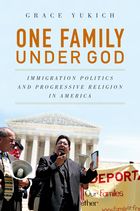18Jun 2014
New Book: One Family Under God
09:11 - By Administrator - Publications
One Family Under God: Immigration Politics and Progressive Religion in America - Grace Yukich - Oxford University Press 2013

http://ukcatalogue.oup.com/product/9780199988679.do
- Focuses on progressive religious activists, a group that has often been ignored in favor of focusing on conservative religious activists or secular leftists - Focuses on stories of mixed-status immigrant families in danger of being separated through deportation and the complexities surrounding their cases, which challenge simplistic understandings of immigration status - Introduces a new theoretical concept-the multi-target social movement-and develops hypotheses about how having multiple targets might shape a movement
Behind the walls of a church, Liliana and her baby eat, sleep, and wait. Outside, protestors shout Go back to Mexico! and Tax this political church! They demand that the U.S. government deport Liliana, which would separate her from her husband and children. Is Liliana a criminal or a hero? And why does the church protect her?
Grace Yukich draws on extensive field observation and interviews to reveal how immigration is changing religious activism in the U.S. In the face of nationwide immigration raids and public hostility toward illegal immigration, the New Sanctuary Movement emerged in 2007 as a religious force seeking to humanize the image of undocumented immigrants like Liliana. Building coalitions between religious and ethnic groups that had rarely worked together in the past, activists revived and adapted sanctuary, the tradition of providing shelter for fugitives in houses of worship. Through sanctuary, they called on Americans to support legislation that would keep immigrant families together. But they sought more than political change: they also pursued religious transformation, challenging the religious nationalism in America's faith communities by portraying undocumented immigrants as fellow children of God.
Yukich shows progressive religious activists struggling with the competing goals of newly diverse coalitions, fighting to expand the meaning of family values in a globalizing nation. Through these struggles, the activists both challenged the public dominance of the religious right and created conflicts that could doom their chances of impacting immigration reform.